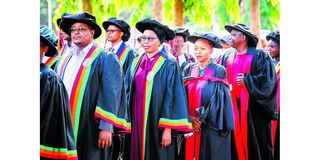Sokoine university aims for research excellence in Africa

Sokoine university Chancellor, Judge Joseph Sinde Warioba (middle), followed to his right by the university’s Council Chairman, Justice Mohamed Chande, Deputy Vice Chancellor for Planning, Administration and Finace, Prof Amandus Muhairwa. To the left is the Vice Chancellor, Prof Raphael Chibunda and Deputy Vice Chancellor for Academics, Research and Professional Guidance, Prof Maulid Mwatawala, during Friday’s 40th graduation ceremony. PHOTO | COURTESY
What you need to know:
- SUA’s vision of being a leading university in the provision of quality knowledge, skills and innovations in agriculture and allied sciences was yet again actualised on the main campus (Edward Moringe) situated 3km south of Morogoro Municipality.
- With the mission to undertake training, research in agriculture and allied sciences and to deliver highly competitive outputs that contribute to national, regional and global socio-economic development, this year 3,744 students were awarded different certificates and degrees.
For a very long time, the main challenges facing universities in the country have been mostly infrastructure, including classrooms, laboratories for practical training, hostels, and a shortage of staff.
Located on the slopes of the Uluguru Mountains in Morogoro Region, Sokoine University of Agriculture (SUA), like many others, has been entangled with such setbacks, even though it continues to be one of the best education hubs in the country.
The higher education institution has been the best when it comes to agricultural research, whose findings have brought about a revolution in the agriculture sector.
“Along with the successes achieved, there are also various challenges that we are facing. The biggest one being a lack of enough infrastructure and a shortage of staff,” SUA Vice Chancellor, Prof Raphael Chibunda revealed while addressing the university’s 40th graduation ceremony last week.
However, the arrival of a major project, which aims to transform various aspects of higher education, such as financing, infrastructure expansion and capacity building, has begun to change things to the good of local higher learning institutions, including SUA.
The Higher Education for Economic Transformation (HEET) project is a five-year venture worth $425 million (Sh972 billion) under the auspices of the World Bank, which aims to support Tanzania’s efforts in unleashing the power of higher education to propel the country’s economic development and transformation.
As a result of the project, Prof Chibunda notes that SUA has a special plan for the construction of new infrastructure at the Edward Moringe, Solomon Mahlangu and Mizengo Pinda campuses through the HEET Project.
In the project, the agriculture think tank hub has been allocated Sh73.6 billion for the construction and repair of infrastructure, the improvement of curricula, the purchase of equipment and the facilitation of staff training.
Through the project, Prof Chibunda notes that the college will construct 11 buildings for learning and teaching. Six buildings will be built at the Edward Moringe Campus, two at the Solomon Mahlangu Campus and three at the Mizengo Pinda Campus.
“These buildings include three hostels, three academic buildings, one dormitory, three laboratories and one building for promoting research and innovation in the fields of engineering and IT,” explains Prof Chibunda.
Also, he says they are grateful to the government for giving the university permission to hire 140 new employees (93 academics and 47 operators). So far 77 employees have been hired and reported to work.
“The employment process for the remaining employees is in various stages of implementation. These employees will help a lot in reducing the challenge of employees shortage,” he explains further.

A group photo of SUA academicians heading to the graduation ground. PHOTO | COURTESY
Flying the flag in research
In the field of academics and research, the university has continued to do well. Acording to the results provided by the Google Scholar citation index in July, 2022, SUA ranked first nationally in the field of research, and 42nd in Africa.
In addition, on the list of the 1000 best researchers in Tanzania issued by the Ad Scientific Index organisation, SUA has continued to provide the best researchers in the country with a total of 222 researchers on the list.
“Of the 100 best researchers in Tanzania, 33 are from SUA and the number one researcher in the country comes from SUA,” shares Prof Chibunda.
Despite everything, the college continues to expand with the aim of reaching out to many Tanzanians. In this regard, the expansion of the Mizengo Pinda Campus in Katavi region continues with the construction and renovation of infrastructure to strengthen the learning and teaching environment for community members and staff.
The college has spent Sh1.5 billion on the construction and repair of infrastructure and the purchase of equipment and services.
During the month of November, the college received 25 new research projects worth Sh8.07 billion. The projects are being funded by various stakeholders from inside and outside the country.
“The college has continued to facilitate various types of research as part of building the capacity of young researchers to conduct research and find answers to the various challenges facing our society,” says Prof Chibunda.
According to him, the college spent more than Sh458 million to fund research activities, publications and creativity of 34 young academics.
Likewise, the college bought various machines and equipment for the Agricultural Engineering workshops. The equipment purchased include a CNC lathe machine, vertical milling machine and drawing tables worth Sh450 million.
In order to make the college live its dream of being the centre for the best researchers and graduates, there has been an improvement in practical training farms including the completion of the establishment of a catfish hatchery plant in the Aquatic Division.
The plant has the capacity to produce two million (2,000,000) catfish fry per month. “So let me take this opportunity to invite fish farmers to come and buy the best fish fry from here.”
The college has completed the construction of the Cross- Learning Building with eight classrooms and eight laboratories. The building was built at a cost of Sh11.7 billion and has the capacity to accommodate 3,205 students at a time.
Contribution to the nation
The institution continues to produce many graduates who are self-employed in various sectors including modern agriculture, fish farming, chicken and cattle farming, and others while focusing on environmental care innovations. There are many employees both in the government and in the private sector who continue to represent the college well.
According to the Vice Chancellor, the institution that produces agricultural leaders has been trusted and has produced managers for a variety of public service positions and private organisations.
He says his employees have been appointed to hold various leadership positions in institutions, ministries and the chairmanship and delegation of boards and committees in various organisations in the country.
“During this reporting period, eight employees were appointed by the appointing authorities, including the President, Samia Suluhu Hassan, to hold various positions.”
One of the civil servants who continue to fly the flag of the agricultural college is Selemani Jafo, Minister of State responsible for Union and Environment. Mr Jafo who is an alumni graced the convocation ceremony on November 24, 2022.
Mr Jafo explained that when he was studying at the college 20 years ago, there were less than 5,000 students but now the number of students has increased to more than 15,000.
“It is not the increase in students alone, but you have also increased the wide spectrum in the field of specialisation. Those who do not know where this college came from cannot explain the great transformation that is taking place,” explained Mr Jafo.
“I came to study here and until now I believe, when SUA students graduate they are well known as being ‘trainable’. If students leave here and are employed anywhere, they have the ability to work and represent this university well,” he added.
The minister noted that SUA has helped him a lot in his work and has made him continue with the same effort whenever he is given the opportunity to lead or work in any place, including the various ministries he has worked for.
About the 40th graduation ceremony
SUA’s vision of being a leading university in the provision of quality knowledge, skills and innovations in agriculture and allied sciences was yet again actualised on the main campus (Edward Moringe) situated 3km south of Morogoro Municipality.
Thousands of people, including parents, and more than 3000 graduates, friends and guardians filled the front of the campus on Friday, November 25, waiting to be awarded their certificates and celebrate the excellence that came from the college.
With the mission to undertake training, research in agriculture and allied sciences and to deliver highly competitive outputs that contribute to national, regional and global socio-economic development, this year 3,744 students were awarded different certificates and degrees.
In this year’s graduation, there were a total of 59 study programmes with a total of 3,744 graduates (2,223 men and 1,479 women).
Bachelor’s degree graduates who were eligible to be awarded were 3,425 (2,083 men and 1,342 women), and Master’s degrees were 41 (23 men and 18 women).
One man and one woman received Higher Education Diplomas. There were nine PhD graduates (eight men and one woman).
Likewise, there were 220 Diploma graduates (121 men and 99 women) and 48 Certificate graduates (29 men and 19 women). The total number of women awarded in the graduation was 1,479, accounting for 39.5 percent of all graduates.
“The number of graduates for the academic year 2021/2022 has dropped slightly from 4078 in 2021 to 3,744 as some graduated during the mid-year graduation ceremony held in May,” Prof Chibunda explained during his speech.
In addition, he said that after graduation, it is time for graduates to reflect on a new chapter in their lives; where they will enter the world and work environment and nation building.
“The hard work and honesty you demonstrated during your studies, as well as the spirit with which you studied, you should maintain in your workplaces in order to be successful,” he advised.
“It is our expectation that this success will be a catalyst for efficiency, productivity, and innovation in various nation-building activities, including generating wealth and providing quality services to the community and the nation as a whole,” he added.
In addition, he said they expected their graduates to be good ambassadors to promote the university well with their good behaviour and work ethics.
“It is the expectation of the university that the graduates will use the education they have acquired to work hard, professionally and creatively for the development of our country.”
Meanwhile, it was revealed that the college has registered 5,025 undergraduate and postgraduate students for the academic year 2022-2023. In addition, the College has registered a total of 187 students for postgraduate studies (Master’s and PhD).
Currently the college has a total enrollment of 16,556 students. There are 15,522 undergraduate students and 1,034 advanced degree students among them.
“There are 112 foreign students at the college (27 undergraduate degrees and 85 advanced degrees) from various countries on the African continent and outside the continent,” said Prof Chibunda.
SUA is best known for offering courses and programmes widely in the fields of agriculture, veterinary science, forestry, animal science, wildlife management, tourism management, environmental science, food science, natural resources, nutrition, and rural development, since its establishment.
Campuses
The main campus (Edward Moringe) is situated 3 km south of Morogoro Municipality, while the Solomon Mahlangu Campus (which was until 1992 known as the Solomon Mahlangu Freedom College of the African National Congress of South Africa) is situated 11 km to the north-west of Morogoro Municipality.
Another one is the Olmotonyi Campus in Arusha, which also serves as the centre for practical forestry training, Mazumbai Forestry Reserve, in Lushoto (this is a natural forest used for training and research), and the Mizengo Pinda Campus in Katavi Region.





